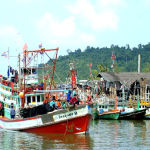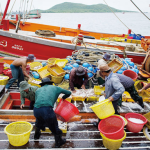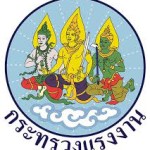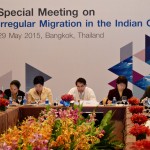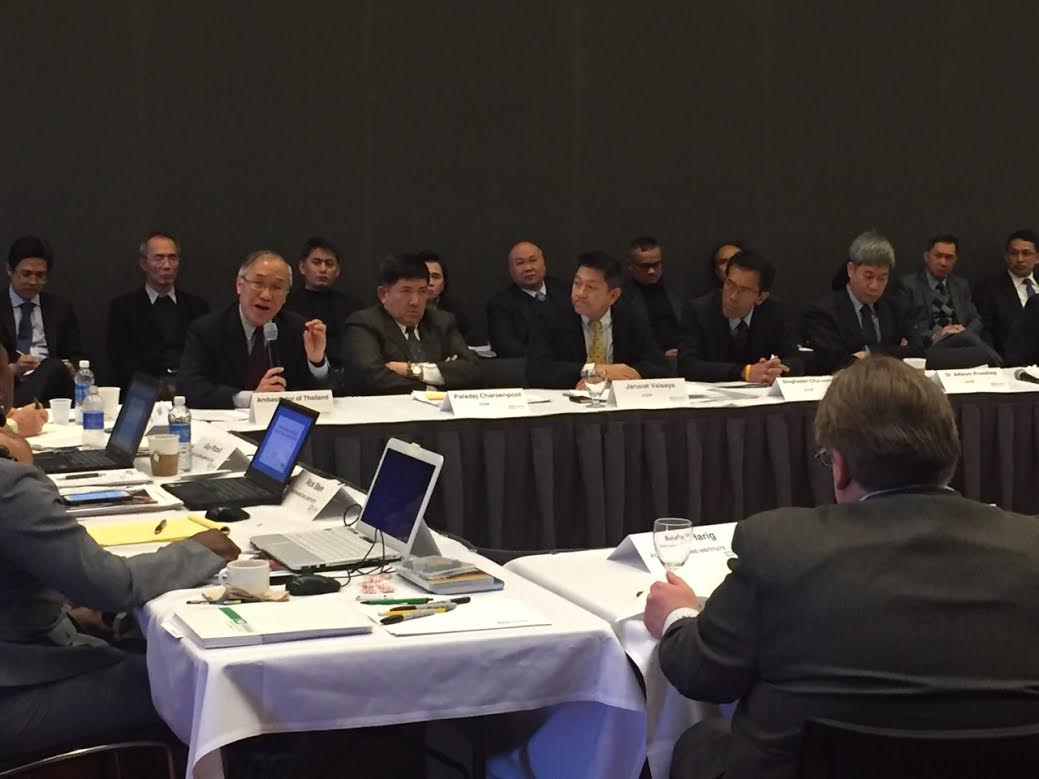
Thailand’s fisheries reform:
Progress and way forward in the fight against IUU fishing and forced labor
Meeting with the Food Marketing Institute’s Seafood Committee
At the Seafood Expo North America 2016
March 5, 2016, Boston, Massachusetts
**********************
2015 marked a major turning point for Thai fisheries. The Thai government embarked on a comprehensive fisheries reform to tackle deep-seated problems in the fisheries sector.
Guided by the FAO and other relevant international standards, the reform aims to revamp fisheries management and governance, with a view to rooting out illegal, unreported and unregulated (IUU) fishing as well as human trafficking and forced labor in the fisheries sector. The end goal is to ensure sustainable and responsible practices in all aspects of Thailand’s fisheries sector.
Tangible progress has been made over the past several months. Looking ahead, the Thai government is firmly committed to steering the next phase of the fisheries reform, and strengthening collaboration with all stakeholders and foreign partners in the fight against IUU fishing and forced labor.
I. Overhaul of fisheries legislation and management
As the first steps of the reform, Thailand has overhauled the legal and policy frameworks governing the fisheries sector, grounded in international principles and standards relating to sustainable and responsible fisheries.
- A new fisheries law, the Royal Ordinance on FisheriesE. 2558 (2015), was enacted and entered into force on 14 November 2015. The law significantly empowers relevant authorities to combat IUU fishing and unlawful labor practices in the fishing and seafood industries.
- It introduces proportionate and deterrent penalties, with a maximum fine of 30 million baht (about 833,000 USD).
- Infringements could lead to serious administrative sanctions, including the revocation of the fishing license and vessel registrar, as well as the suspension or closure of seafood processing factories with illegal migrant workers.
- Almost all 53 high-priority subordinate laws were already approved, with a few pending. This will ensure full and effective implementation of the Royal Ordinance in the fight against IUU fishing and forced labor.
- We are expediting the process of ratification of the U.N. Fish Stocks Agreement and the FAO Port State Measures Agreement.
- The government adopted the Marine Fisheries Management Plan (FMP), which outlines the key principles and policy priorities designed to tackle overfishing and overcapacity of the Thai fishing fleet.
- The government approved the National Plan of Action to Prevent, Deter and Eliminate IUU Fishing (NPOA-IUU).
- The government established the Command Center for Combating Illegal Fishing (CCCIF) in May 2015. Led by the Royal Thai Navy, the CCCIF coordinates the efforts of all state agencies in the fight against IUU fishing.
II. Tackling overfishing and overcapacity in Thai water
The FMP identifies overcapacity of the fishing fleet and overfishing as the most critical challenges in Thai fisheries. The government has taken firm actions to tackle both problems.
- The government has frozen registration of new fishing vessels since August 2015.
- The government completed a nationwide survey of every Thai-flagged fishing vessel, creating a reliable and up-to-date database of 42,000 vessels that form the Thai fishing fleet.
- Illegal fishing vessels – those without valid fishing licenses and vessel registrars – have been prohibited from porting out and are to be withdrawn permanently from the fishing fleet. 8,024 illegal fishing vessels had their vessel registrars revoked in November 2015.
- A vessel buy-back scheme has been prepared, with various compensation packages and new job training provided to different groups of affected fishermen. The buy-back of all illegal fishing vessels are expected to be completed over the next 2-3 budgetary years. The decommissioned vessels will be scrapped, turned into artificial reefs or used for non-fishing purposes.
- The FMP emphasized the science-based approach to fisheries management. In particular, it made use of the size of the fishing fleet and the available fishery resources to calculate the maximum sustainable yield (MSY) – a level of catch that ensures the long-term existence of the fish species and prevents their depletion.
- Thailand has undertaken a reform of the fishing license regime. Starting in April 2016, the issuance of new fishing licenses shall be consistent with the MSY stipulated in the FMP. The number of fishing licenses granted will not exceed the level of catch permitted by the MSY. The new fishing license regime thus marks a transition from open-access to limited-access fisheries. It will eliminate overcapacity of the fishing fleet and overfishing, preventing the degradation of fishery resources.
- Fishing without a valid license is considered a “serious infringement” under the Royal Ordinance, and carries a maximum fine of 30 million baht (833,000 USD).
- Once given a fishing license, each Thai-flagged commercial fishing or carrier vessel is required to keep onboard a booklet which contains all key data relating to that vessel, such as the vessel registrar and fishing/carrier license in Thai or foreign waters. Such data are integrated and recorded in the e-license system, which is accessible electronically to the Marine Department and the Department of Fisheries offices in Bangkok and all coastal provinces. The e-license system also permits cross-checking of data, with a view to ensuring consistency between the data on vessel registrars and fishing licenses.
- Every vessel with a fishing license will be given a sticker with QR Code, to be attached to the vessel’s control room, along with a marking, to be written at the front part of the vessel’s hull. The marking indicates the vessel’s size, fishing gear and designated fishing area (clear and distinct markings for vessels eligible to fish in the Gulf of Thailand and the Andaman Sea). Failure to display the marking is a violation of Section 81(4) of the Royal Ordinance on Fisheries, which imposes a maximum fine of 4 million baht (111,000 USD). Falsification, concealment or modification of the marking is a violation of Section 165 and could lead to a maximum fine of 30 million baht (833,000 USD)
- The e-license system, together with the QR Codes and markings, will bolster the monitoring and at-sea inspection of fishing vessels and faciliate the detection of illegal fishing activities.
- To achieve the MSY, a vessel day scheme is introduced in the FMP to limit the number of days fishing vessels can operate. The number of allowable fishing days differs across different fishing gears (trawlers, purse seiners and anchovy purse seiners) and across the Gulf of Thailand and the Andaman Sea.
- A ban on highly destructive fishing gears has been effective for months. Push net vessels, in particular, are being decommissioned through a buy-back scheme.
- To ensure full implementation of the fisheries law and policy, the government is committed to bolstering the financial, technical and human resources of the Department of Fisheries and other concerned agencies.
- Earlier this year, the Cabinet approved a budget of 810 million baht (about 22.5 million USD) to be used in the fight against IUU fishing.
- The Department of Fisheries has set up a new division dedicated to tackling IUU fishing. A plan for the restructuring of the Department is also being formulated, with the goal of improving its capacity to undertake fisheries oversight and combat IUU fishing.
III. Stricter control on Thailand’s overseas fishing fleet
Thai authorities have taken decisive actions to strengthen control of Thailand’s overseas fishing fleet, and bolster law enforcement against illegal fishing and labor malpractices in the overseas fishing industry.
- Stricter rules and requirements for the issuance of overseas fishing license (required for every Thai-flagged fishing vessel wishing to operate internationally):
- Vessels are allowed to fish only in the water under the jurisdiction of a coastal state with which Thailand has signed an MoU on fisheries cooperation. The cooperation between Thailand, as the flag state, and the coastal states where Thai vessels operate, will ensure effective monitoring of the Thai overseas fleet.
- If the vessels wish to operate in the high seas, they can only do so in the areas under the control of a regional fisheries management organization (RFMO) or international organization of which Thailand is a member.
- Vessels are required to have an “IMO number”, a ship identification number assigned by the International Maritime Organization (IMO) under the International Convention for the Safety of Life at Sea (SOLAS Convention). The use of the IMO number improves the transparency and monitoring of the Thai fleet fishing internationally.
- Vessels need to have valid sanitation certificates, and have in place arrangements to secure the health, safety and welfare of the crew.
- Vessels must be equipped with VMS and must not use prohibited fishing gears.
- A temporary ban on at-sea transshipment of aquatic animals has been introduced.
- The Department of Fisheries prohibits Thai-flagged vessels from engaging in any transshipment of fish at any sea outside Thai waters for a period of 180 days (ending in June 2016). The ban may be extended if necessary.
- The ban, introduced pursuant to Section 87 of the Royal Ordinance on Fisheries, is designed to eliminate the possibility of transshipment of IUU fish by Thai-flagged vessels operating in high seas and territorial waters of foreign states. The measure is also expected to prevent illegal at-sea transfer of seamen between fishing vessels.
- Exception to the ban is made only in cases where the vessel is given authorization in accordance with the regulations of the coastal state where the transshipment takes place, or where such transshipment is under the supervision of a relevant international organization, or where there is a qualified fisheries observer on board to monitor the transshipment.
- The Royal Ordinance specifies that every Thai-flagged fishing vessel operating outside Thai waters must have a fisheries observer stationed on board to ensure that fishing operation complies with international standards and fisheries regulations.
- The observer’s main tasks are to observe the fishing operation, collect data and the specimen of aquatic animals caught by the vessel for traceability purposes, and submit a summary report to the competent official. In addition, the presence of the observer helps to deter illegal labor practices on board.
- The first batch of observers (20 of them) completed their training in December 2015 while the second batch of observers are being trained. The Department of Fisheries have been preparing operating manuals and report forms, and formulating necessary rules and regulations to ensure the effectiveness of the observer program.
IV. Upgrading monitoring, control and surveillance (MCS)
- The National Plan of Control and Inspection (NPCI) has been formulated to enhance MCS of fishing activities in a systematic and effective manner.
- The Department of Fisheries has set up a Fisheries Monitoring Operation Center (FMOC) equipped with Vessel Monitoring System (VMS) The VMS system is already operational, enabling us to monitor real-time activities of approximately 2,000 commercial fishing vessels above 60 gross tonnage. No vessel above 60 gross tonnage is allowed to operate without VMS equipment installed. Automatic alarms have been set up to detect suspicious illegal fishing activities. We are working with international partners, including the Environmental Justice Foundation (EJF), to further enhance VMS capabilities, especially in risk and behavioral analysis of fishing vessels.
- We have set up 28 Port In – Port Out (PIPO) Control Centers in 22 coastal provinces nationwide, operational since 6 May 2015. Thai fishing vessels are required to report to PIPO Centers for inspection every time they port out and port in. For port-out inspection, PIPO officers carry out physical and documentation checks, such as the vessel registrar, fishing license, fishing gear, VMS equipment and the crew’s work permits and qualifications. No ship is permitted to port out unless it fulfils all requirements. For port-in inspection, PIPO officers crosscheck the fishing logbook record with VMS data to identify any suspicious illegal fishing activity. The seamen onboard are also checked upon port in to ensure that they correspond to the crew list submitted when the vessels port out. These strict PIPO procedures are designed to prevent and detect illegal fishing and the use of illegal workers on board.
- Apart from the inspection at PIPO centers, the CCCIF taskforces have intensified at-sea inspection of fishing vessels operating in Thai water. The taskforces are under supervision of the Thailand Maritime Enforcement Coordinating Center (THAI-MECC). The inspection is based on the risk analysis approach, making use of VMS data to identify target vessels suspicious of illegal fishing. Since May 2015 to 13 January 2016, 8,398 fishing vessels of all size were inspected at sea. Over 430 cases of infringements were found and legal action taken accordingly.
V. Ensuring traceability of fishery products
- We are upgrading the catch certification scheme and strengthening the traceability documentation requirements, such as marine catch purchasing documents (MCPD), marine catch transshipment documents (MCTD) and processing statements. Validation of catch certificates is subject to strict criteria. Failure to fulfil any of the criteria will lead to the refusal of catch certificate issuance.
- We have been strengthening inspections of fishery products during landing at port and offloading, as well as enhancing traceability databases and information sharing among relevant agencies.
- The Department of Fisheries and the Customs Department signed a Memorandum of Arrangement (MoA) concerning the Control and Examination of Imported, Exported and Transited Aquatic Animals to Tackle IUU Fishing on 13 November 2015. The implementation of the MoA is already underway, resulting in improvements in inter-agency cooperation and capacity to prevent the importation and transit of IUU fish. It has also led to better data collection and statistics on fishery imports and exports.
- We are developing an electronic traceability database system called the Processing Statement and PSM linked System (PPS). The system will enable effective synchronization and cross-checking of data from different databases, such as the fishing logbook, MCPD and VMS.
- Seven concerned Thai agencies signed a MoU to bolster data sharing in the Fishing Info 2 database, which contains important information about fishing vessels and their fishing licenses and records.
- We have started Port State Measures (PSM) implementation since 1 September 2015. PSM are applied to all foreign fishing vessels and carriers above 30 gross tonnage landing at Thai ports.
- We have designated 27 ports for foreign vessels, including 15 ports for foreign fishing vessels and carriers and 12 ports for vessels from neighboring countries. Foreign-flagged vessels are required to notify the Thai authorities and present traceability-related documents in advance of porting in. If any incoming vessel fails to meet the PSM requirements or is listed as an IUU vessel, it will be denied entry to port. All foreign vessels are also subject to PSM inspection upon porting in.
- An inter-agency committee has been set up to expedite the process of Thailand’s ratification of the FAO Port State Measures Agreement (PSMA).
VI. Regularization and protection of migrant workers
The Thai Government recognizes the important role of migrant workers in supporting the Thai fishing and seafood processing industries. Regulatory changes are being introduced to facilitate the regularization of illegal migrant workers in the sector and provide registered workers with greater flexibility in obtaining and extending their work permits. These measures are designed to combat forced labor and other forms of exploitation in the fisheries sector.
- The government has started a new round of registration of illegal migrant workers (and their dependents) in fishing vessels and seafood processing factories (for nationals of Cambodia, Lao PDR and Myanmar). As of 25 February 2016, over 130,000 undocumented migrant workers in the fisheries sector have registered (including their dependents).
- Under the ongoing round of registration, which started in November 2015 and will end in August 2016, more than 23,000 undocumented migrant workers in fishing vessels were registered, bringing the total number of registered workers in sea fishery to 77,000. Moreover, 57,000 undocumented foreign workers in the Thai seafood processing industry have been regularized. All documented workers are given protection, welfare and the right to work for one year. The government plans to extend the length of their work permits to 2 years, renewable for up to 8 years (2+2+2+2).
- The Ministry of Labor is conducting a survey to estimate the number of migrant workers that are needed in the Thai fishing industry. The assessment takes into account the number of fishing vessels with valid vessel registrars and fishing licenses, across different types of fishing gear. If the number of migrant workers is inconsistent with the number of fishing vessels, it may be an indication of IUU fishing activities and we can take appropriate actions.
- The government adheres to a non-deportation policy. Undocumented workers rescued after raids or inspections of vessels and factories are treated as victims and will not be deported to their countries of origin. Instead, they are provided shelter, matched with new employers, and subsequently regularized.
- The Ministry of Labor has revised rules to provide migrant workers with greater flexibility to change employers. Two groups of workers, in fishing vessels and in seafood processing factories, are now permitted to change their employers within the same group. There is no limitation on the number of employers or provinces in which the workers can work. These measures, effective since 2 November 2015, significantly increase the freedom and job mobility of alien workers.
- The Policy Committee on Migrant Workers is compiling policy recommendations for future reform of the labor migration system, including revision of laws and regulations and anti-trafficking plans. One of the key reform objectives is to eliminate illegal labor brokers. The relevant authorities are in close consultation with the ILO and all stakeholders in this process.
- The Ministry of Labor revised the Ministerial Regulation on Labor Protection in Sea Fishery Work, which has taken effect since December 2014. The Ministerial Regulation re-asserts existing provisions to meet international standards, including ILO Work in Fishing Convention (No. 188). The Ministry of Labor closely engaged the ILO in drafting the regulation. Key provisions of the Ministerial Regulation include prohibition of recruiting workers under 18 years of age on fishing boats, compulsory rest hours and holidays, mandatory signed work contract, crew list, and requirements on training and welfare of workers.
- Regulations also prohibit the employment of children under 18 years of age in the fishing and seafood industries.
- The Cabinet approved the ratification of the ILO’s Occupational Safety and Health Convention No. 187 in September 2015. The formal instrument of ratification will be deposited for registration by the Director-General of the ILO soon. Moreover, concerned agencies are considering existing laws and the necessary revisions of the law in order to ratify the ILO’s Work in Fishing Convention No. 188 in the future.
VII. Strict law enforcement and sanctions
With improved legal and policy groundworks in place, the government is redoubling its efforts to enforce the fisheries law and implement the fisheries management plan. We intend to impose criminal and administrative sanctions on those guilty of violating fisheries and labor-related laws.
Actions against IUU vessels operating in foreign waters
- Thai authorities recently arrested six Thai-flagged tuna trawlers that engaged in illegal fishing in foreign waters.
- Earlier in January 2016, Thailand’s VMS detected six tuna trawlers fishing without license in the Indian Ocean. Since then, the Thai Department of Fisheries has notified the relevant coastal states (Mauritius, Madagascar and the Seychelles) of suspected illegal fishing by these vessels. It also requested the Indian Ocean Tuna Commission (IOTC) to include these vessels into its Provisional IUU Vessel List. Moreover, the Ministry of Agriculture and Agricultural Cooperatives also declared the six ships “IUU vessels” and prohibited their operations for two years.
- To date, we have arrested all six vessels. On 30 January 2016, an inter-agency task force led by the Royal Thai Navy intercepted Mook Andaman 018 and Mook Andaman 028. Later on 14 February, two more vessels, Yu Long 6 and Yu Long 125, were arrested. Hung Chi Fu 68 and Ceribu were subsequently arrested. All six vessels are now detained at the Phuket port.
- The vessel registrars of all the six vessels have been revoked in accordance with the recently enacted Royal Ordinance on Fisheries B.E. 2558 (2015). The catch of aquatic animals and fishing gears on board the four detained vessels were also confiscated.
- The three owners of the six vessels, as well as the captains of the four detained ships, have been arrested and pressed with a number of charges due to violations of the Royal Ordinance on Fisheries and other related laws. The owners are subject to one year of imprisonment or a fine of up to 100,000 baht (2,800 USD) or both as a result of the violation of the NCPO Order No.10/2558. In addition, they are subject to a fine of up to 30 million baht (833,000 USD) and other sanctions under the Royal Ordinance on Fisheries. Concerned agencies are inspecting the detained vessels and interrogating all the seamen on board to determine if there are further charges to be filed, particularly on forced labor.
Tackling the use of illegal workers in Thai-flagged overseas fishing vessels
- The Director-General of the Department of Fisheries ordered all vessels operating outside Thai waters, which did not previously report to one of the Port in – Port out Control Centers when porting out, to return to port for inspection by 30 January 2016. A special task force comprising officers from concerned agencies have conducted inspections of Thai-flagged fishing vessels operating outside Thai waters in the Indian Ocean.
- Representatives from the International Labor Organization (ILO) and Greenpeace were invited to observe the inspection during 2-5 January 2016. ILO and Greenpeace representatives recognized the well-organized operations, during which the seamen on board were interviewed, their documents checked and their records collected.
- The inspection scheme has uncovered infringements of related fisheries and labor laws in 39 vessels. Examples of violations include the absence or expiration of valid overseas fishing license, the failure to record fishing data in the logbook, and the use of illegal migrant workers on board without appropriate work permits and employment contracts.
- Owners of the vessels are charged with the use of illegal migrant workers, a violation of Section 83 of the Royal Ordinance on Fisheries. If found guilty, the owners are subject to a substantial fine of 400,000 – 800,000 baht (11,000 – 22,000 USD) per each illegal worker.
Crackdown on human trafficking and forced labor in the fishing industry
The government has intensified the crackdown on trafficking in persons and forced labor in fishing and seafood processing industries.
- In 2015, 41 cases of trafficking in the fishing industry were taken up by law enforcement agencies. 12 of these are on trial, and in one case the Court sentenced the convict to 8 years in prison.
- In one of the high-profile cases, the Thai authorities arrested 8 suspects, including the President of Kantang Fishing Association (Trang province) on charges of trafficking in persons and forced labor in the fisheries sector on 7 November 2015.
- Over the past few months, 150 seafood pre-processing plants have been inspected, leading to legal action in 46 cases and a closure or suspension of 17 factories.
- In one of the shrimp peeling sheds inspected on 9 November 2015 (the ‘Kik’ shrimp peeling shed subsequently featured in the AP Report dated 14 December 2015), five suspects were arrested and charged with a trafficking offense and a number of violations of immigration and labor protection laws. The shed was shut down.
- Major Thai seafood exporters (members of the Thai Frozen Food Association) have stopped sourcing shrimps from peeling sheds. Instead, they have brought all shrimp pre-processing operations in house. The Ministry of Labor assisted over 3,000 migrant workers from the now-closed shrimp peeling sheds in finding new employers.
- Thai authorities have been planning the next round of inspection of fishing vessels and seafood processing plants in the first half of 2016. High-risk targets have been identified based on intelligence analysis.
- Given the complex nature of trafficking cases, new divisions exclusively dedicated to handling trafficking cases have been set up under the Criminal Court and the Office of the Attorney General to expedite the legal process and bring criminals to justice. The Royal Thai Police and the Department of Special Investigation have previously set up similar units for trafficking cases. Thailand is therefore the first Southeast Asian country to have introduced trafficking-specific divisions in every stage of the judicial process.
VIII. Forging international partnership
The Thai government seeks and welcomes collaboration with foreign partners and stakeholders to combat IUU fishing and forced labor. We are working with other states, international organizations and several NGOs on fisheries and labor cooperation. Cooperation ranges from capacity building to information sharing.
- We have an active and constructive dialogue with the European Union (EU). The technical advice provided by the EU has been helpful in our fisheries reform.
- We have been engaging 13 other states to advance fisheries and labor cooperation.
- We have signed or are negotiating MoUs on fisheries cooperation with Spain, Indonesia, the Philippines, Malaysia, Fiji, Papua New Guinea, South Korea, Myanmar, China and the Pacific Islands countries.
- We have an ongoing dialogue with Myanmar, Cambodia, Lao PDR and Vietnam to enhance cooperation in the migration of alien workers.
- We are working closely with international organizations, NGOs and multinational corporations on capacity building projects. Examples include:
- The ILO is in close discussion with the Ministry of Labor and other concerned agencies on a project to combat unacceptable forms of work in Thai fishing and seafood industry.
- The U.K.-based Environmental Justice Foundation (EJF) has been working with us to provide intelligence on human trafficking and training on vessel monitoring system for our officers.
- Thailand has reached out to the U.S.-based SkyTruth to explore the possibility of using their technology to further enhance our VMS capabilities.
- Thai fisheries associations are working with the U.K.-based Ethical Trading Initiative (ETI) to address labor problems in the industry.
- We have an ongoing discussion with Nestlé on capacity building programs for the Thai fishing industry.
***********************************
Royal Thai Government
March 2016

